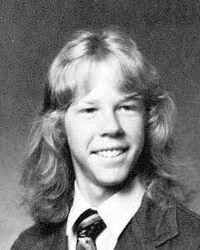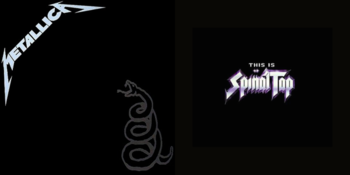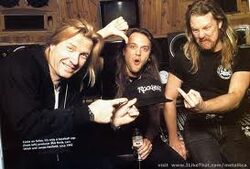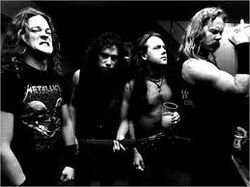The Black Album (Metallica album)
“Metallica want to make a living through slick, accessible pop metal songs?! I expect them to remain an underground thrash band, never make a music video, and sleep in fans' houses for little-to-no profit! So unfair!”
The Black Album (technically titled Metallica, but nobody calls it that) is Metallica's fifth studio album, last metal album, and first pop album, released on August 12, 1991 through Carmen Elektra Records. With mega-hits/ECW themes like "Enter Sandman", "The Unforgiven", "Nothing Else Matters", "Enter Sandman", "Wherever I May Roam", "Sad But True", "Enter Sandman", "Smells Like Teen Spirit", "No Step on Snek", and "Enter Sandman", Metallica reached their goal of mainstream success, which they only wanted just for their ultimate goal of tormenting Dave Mustaine.
The album marked a change in the band's sound, from the "party hard" fast thrash metal style of the band's previous four albums to a slower, less harsh one that preps, jocks, rednecks, and grandmas could sing along to. The album cover likewise marked a change, from covers that told you what it was, to a cover that did not. Though better than later efforts like Load of Blood and Spunk, Reload of Blood and Piss, St. Trash Can Snare, and Lulu Reed Collab, the album disappointed many hard-line fans who wanted an album comprising twelve renditions of "Dyers Eve".
Background[edit]
It was the early 1990s, and Metallica's old friend Dave Mustaine was slowly becoming just as big as them via his own band Megadeth. Metallica, being the pranksters they were, decided they could easily make a best-selling album just to piss Mustaine off. Knowing that they needed to change their style in order to reach mega-popularity, the band embarked on a series of steps to reach their goal.
First, they ditched Lars Ulrich's child-sized sandpaper drumkit that he used on ...And Justice for All and bought him a sturdier adult-sized one. Secondly, they went to look for a bassist, to replace their friend Cliff Burton who tragically passed away in 1986. They remembered that they already had one, Jason Newsted. James Hetfield asked "Hey man, where the hell have you been?"; Jason, the anodyne bassist, replied "Uh, you guys were totally abusing me and not letting me play. And when you did, you turned the bass down real low, to make it seem I wasn't even there." "Oh yeah!" James remembered.
Thirdly, they looked for a producer. They found the number of the most hardcore metal producer in the business, who was easily able to make the greatest metal album of all-time. Unfortunately, Dave Jerden was with Alice in Chains at the time recording Dirt. So Metallica instead hired the infamous Bob Rock, purveyor of AOR sensibility, mainly due to Lars's artistic admiration of Mötley Crüe. Rock was excited to work with Metallica, but he needed to lay down some ground rules:
| “ | Bob Rock: Okay guys. There are some things you're gonna have to do. One, you have to slow down. No more fast songs like "Battery". They make people shit their pants, and no one likes to buy albums that give them soiled pantaloons. Two, you have to make shorter songs. If the song is too long, radio stations are not gonna play them.
Lars Ulrich: But "Stairway to Heaven" was long! Bob Rock: But Led Zeppelin was actually good. Three, you should work on some catchy hooks. Not Madonna catchy, but Mötley Crüe catchy. And no Lars, the intro to "Frayed Ends of Sanity" is not what I mean. Lars Ulrich: Awww maaann! Bob Rock: Also, you might want to add a symphony or two. Just to rub it in the faces of those losers who wanted a thrash metal album. Jason Newsted: Haha. That would be funny. Everyone else: SHUT UP! Jason Newsted: S-sorry... Bob Rock: So if you take all these recommendations, you guys will be on your way to mega popularity and making Dave totes jealous! Kirk Hammet: This will sure get him back for doing my girlfriend. |
” |
Songs[edit]
The only song explicitly about Mustaine was "Enter Sandman" (Dave Mustaine was secretly an Arab). The rest of the songs cover an array of subjects, from werewolves to God to Newsted's virginity. However, many of them can be additionally interpreted as jabs at Mustaine, yet somehow also can be attributed to Mustaine, whom Megadeth fans believe wrote every song in the Metallica catalogue.
All songs written and composed by James Hetfield and Lars Ulrich, because the other two members were too scared/lazy to stand up to them/come up with original ideas.
- "Enter Sandman"
The first single was also the one song explicitly about Mustaine, as it described the nightmares he would get after hearing of Metallica's success. It was specifically designed for mainstream success, but what made it especially torturous was that it incorporated the "good night prayer", which Dave originally incorporated into Megadeth's song "Go to Hell" (released a mere 11 days before "Sandman"); because of "Enter Sandman"'s ubiquitous radioplay, Dave would be constantly reminded of his failure to reach success with a good idea. After the prayer, Metallica jabbed Dave with the lyrics "Hush little Davey/Don't say a word/And never mind that noise you heard/It's just the sound of your former band/Hitting number one in all the land!" Needless to say, "Enter Sandman" is Mustaine's least favorite song ever, after "Achy Breaky Heart".
- "Sad But True (Not as Bright But Richer than You)"
This song was originally a fast thrash masterpiece, but Bob Rock slowed it down just to mess with its audience. "Sad But True" is an exploration of a person's dual nature: good vs. evil. The song can also be interpreted as an eerie prediction of dumb Megadeth fans who call Metallica sellouts but ignore the Risk album.
- "Holier Than Thou"
Finally, after two midtempo radio-friendly songs, we get a faster-paced thrash song. This song was originally going to be titled "Good-for-Nothing, Pencil-Necked, Asshole Diva", as the song actually is about rockstar rival Axl Rose. Bob Rock, however, pointed out that the title made it way too obvious it was about Rose.
- "The Unforgiven"
This song is an auto-biographic piece on Lars's childhood and his struggle against those who subjugated him. The lyric "You label me/I label you/and I dub thee unforgiven" was uttered by Lars to Mustaine back when Dave was still in Metallica, after Mustaine called Ulrich a "freakazoid" upon discovering his stash of freaky Danish porn. If you listen closely you can actually hear a sample from the soundtrack to Clint Eastwood's For a Few Dollars More, although this is hard to distinguish from Hetfield's belabored vocals. Surprisingly, Mustaine would later dub "The Unforgiven" as his favorite Metallica song.
- "Wherever I May Roam"
This song is about all the girls Metallica gets no matter where they go. There was, of course, the exception of Jason Newsted, who didn't get laid until 2005. The song mocks both Newsted and Mustaine, who, after forming Megadeth, got road-brides very infrequently. This was the album's second-least offensive song for Mustaine, since he supplements his sex life with Gigantor reruns.
It has also been discovered that playing this song at 0.78% speed through cheap headphones whilst upside down on a jetski, will lead to the hidden message "ghodWjoh MakTehza," which according to nerds is Klingon for: "Greetings Fishmonger, my feet are demons." This led to much anger from creationists, not for the mention of demons, but for the fact that to them, this was proof of the existence of aliens.
- "Don't Tread on Me"
Also known as "No Step on Snek", this song was named after the album's cover art. Originally intended to become the official song for the fiscally conservative Tea Party movement, Hetfield was very disappointed when he discovered the movement did not yet exist. So, Metallica decided to make it about how Mustaine should never attempt to do Hammet's girlfriend again. In 2019, a Canadian woman made headlines when she blasted "Don't Tread on Me" to scare off a wild cougar from a hiking trail.
The beginning of this song was used to advertise the play West Side Story, in an attempt to appeal to a younger audience. The intro to this song was used as the main tune in the song "America" from the play, and despite controversy about who originally wrote the tune, Metallica retain the right to receive royalties from both songs, despite none of them being born when West Side Story was originally written.
- "Through the Never
-Never Land"
Another throwback to the band's thrash years, this song is an existential look at humanity's place in the universe. Though it may seem that our most profound questions may go unanswered, we have "an obligation to survive" and we must continue on, through the never. The song created substantial existential angst for Lars, to the extent that he complained after the song's recording "Can we go back to making fun of Dave again?"; the rest of the band agreed.

- "Nothing Else Matters"
This ballad was written as an artistic symphony among the likes of many great classical musicians, complete with Hetfield playing a harp instead of rhythm guitar and Kirk Hammet playing a string orchestra instead of lead guitar. Unfortunately, the fans couldn't Handel this classical piece, and immediately rushed to their computers to accuse the band of becoming sellouts. Sadly for them, they had to wait several years for their dial-up Internet to finish loading before they could.
- "Of Wolf and Man"
This song is about a dude who turns into a werewolf. Its topic was picked out of a hat, since Metallica was running out of ideas at this point. Hammet said to a frustrated Hetfield, "Well, at least it's a better topic than 'Breadfan'"; Hetfield nodded his head in agreement. Mainstream fans often doze out by the album's last four tracks, though hardcore fans argue the last four tracks are where the real meat is at.
- "The God That Failed"
In this song, James continues the lyrical tradition of mocking his own parents. This time, he mocks the God that his own mother dedicated her life to. James lyrically attacks God for failing to cure the cancer that he claims his dad gave to his mom. During an interview with Kerrang! magazine, God responded to the criticism saying: "I don't give a damn about what Metallica says about me. Now if Slayer bashed me, on the other hand, I would be devastated."
- "My Friend of Misery"
This song is actually the same exact song as "Holier Than Thou". The repetition occurred because the song originally was going to be an instrumental. Approaching the deadline, however, Newsted proclaimed his approval of the song: "This is like the best instrumental we ever did!" Never wanting Newsted to be happy, Lars and James scrabbled for lyrics, not realizing that they had already used the idea of bashing Axl Rose. Thus, no one was happy with the outcome, except for Bob Rock.
- "The Struggle Within"
The album ends with a military-march song, their last thrash song until Death Magnetic, about a man who fails to take advantage of his opportunities, and stays at home doing nothing instead. James, here, is actually describing himself as a teenager: a kid who didn't want to do anything but be a rock star. "Well, it turned out okay for me," said Hetfield speaking about the song, "But let's face it. Not everyone is as awesome as me. Especially not people named Dave Mustaine."
Reception[edit]
Upon release, The Black Album was met with enormous commercial success. It hit number one in over two million countries, with the only exception being Denmark. The album went on to become the best-selling album of all-time, between 1991 and yesterday. On the back of its success, Metallica went on an epic three-year tour around the world, selling out stadiums even in the third-world countries like Russia. Metallica became so big, "His Holiness" Axl Rose invited Metallica to co-headline with Guns N' Roses, who were on the Use Your Illusion Tour at the time. At the insistence of Bob Rock, Metallica reluctantly agreed, but after only a month, Axl became so unbearable that James lit himself on fire so he could stop touring. Axl Rose was furious that he was being outdone, so he decided to start a huge riot by continuing to play (oh horror!) instead of Metallica. Rose happily returned backstage, knowing he'd caused more destruction than James. After James recovered, the tour went on for a couple more years, going on for so long that by the end Jason Newsted had lost most of his hair; the rest of the band followed suit and cut their own hair in 1996.
Despite all this success, the real success came from the torture of Dave Mustaine. The Black Album was in fact so successful in torturing Mustaine, the H.W. Bush administration decided to use it on Guantanamo detainees. Mustaine tried selling out on multiple occasions, even crapping out a disco album at one point, but after two decades, he finally realized that he will never reach the success of Metallica. He has since found peace through Jesus, the beer bottle, and looking like a Cocker Spaniel.
Since its release, TBA is considered to be one of the greatest metal albums ever made. It is ranked in the top 100 albums of all time in terms of sales, and the opening song “Enter Sandman” has now become one of the most iconic and overused riffs of our generation. It was voted as the 17th best album of all-time by Metal-Fish Magazine in 2010, narrowly beaten by Fleetwood Mac's White Album. Metal-Fish has since been charged with racial bias.
Metallica tried out a number of different styles after The Black Album, such as country twang, cutting their hair, and dressing like U2 on Load and Reload; cover songs on Garage Inc.; an orchestra, no-leaf clovers, and Napster lawsuits on S&M; and nü metallica, trash cannery, and lifestyles determining deathstyles on St. Anger. These experiments generated mixed reactions from fans, prompting the band to return to their original thrash sound with Death Magnetic. Collaborating with Lou Reed, they experimented further with spoken-word avant-garde noise, tables, and small town girls on Lulu, but after facing a huge backlash, they came crawling back to their original sound (we mean it this time) with Hardwired... to Self-Destruct.




